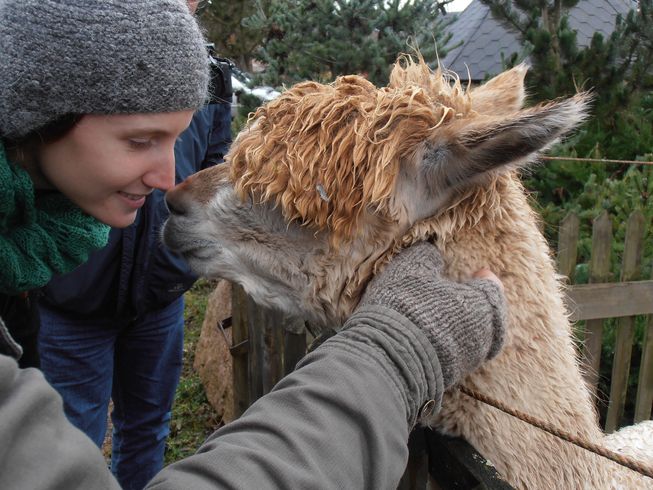
Animals can be great stress relievers. The practice of using domesticated creatures to comfort people has gained mainstream acceptance in recent years. You’ll see one example of this in airports, where volunteer programs and airline initiatives have brought therapy dogs to America’s most hectic hubs to interact with passengers.
The relationship between contact with animals and exercise for stress reduction has also been embraced. Animal yoga, for example, has become a popular trend. It might be tempting to file yoga class with free ranging pets or farm animals under “weird yoga fads” and forget about it. But the trend keeps growing and expanding to include new species of “yoga helpers.” Even some unexpected animals, such as goats and alpacas, are getting in on the action.
If it makes people happy, why not?
Lainey Morse, owner of No Regrets Farm in Oregon’s Mount Hood Territory, started goat yoga classes that have become quite popular. She attributes the success of this unusual offering to a simple idea: It makes people happy. “People are desperate for something that’s happy. Everyone that comes here to the classes drives 100 miles, 300 miles, or flies in. They all live in big cities. They just want to get away from the stress.”
Studies going back to the 1980s have linked pets with health benefits. The link has proven especially true for people with high blood pressure, heart disease and other conditions that have a stress-related component. Harvard University has dabbledwith the idea of giving its faculty and students access to therapy dogs. Other famous universities, including Columbia and Emory, have similar programs.
With this is mind, goat yoga does not seem gimmicky at all. In fact, Morse and others are actively trying to promote goats as therapy animals, touting the mental and physical benefits of spending time with these creatures, while on the yoga mat or in other settings.
Marquam Hill Ranch, also in Oregon (in the town of Molalla), offers yoga sessions with alpacas. The creatures are from South America and members of camelid family, are similar to llamas but are smaller and fluffier and come from a different genus.
Can this really be relaxing? Like their cousins, camels and llamas, alpacas do spit. However, the Marquam’s yoga attendees say that the alpacas seem to be in tune with the zen-like mood that comes along with the yoga class. Also, the class takes place in the alpaca’s home fields, so they are already at ease. Furthermore, most alpacas and llamas will not spit at humans unless purposely provoked.
Like the goat yoga site, Marquam Hill Ranch is located in Oregon’s Willamette Valley, part of the sparsely populated Mount Hood Territory. The views of the surrounding natural landscapes are also part of the allure for people who travel to Molalla for an alpaca yoga session.
There is a bonus for this particular yoga class: Students have the option of attending a wine tasting after they have finished with their exercise session.
Alpaca yoga seems to be taking off in Canada as well. Classes are offered in Montreal and Manitoba. Karine Davidson Tremblay, the owner of Montreal’s Alpagas Fibrefine, an alpaca farm and breeder that holds yoga classes in the grazing fields, points to alpacas’ personality, saying that they work for yoga classes because they are willing to interact with people and that “they’re curious and very affectionate.”
Other alpaca farmers apparently agree. Classes like those offered in Oregon and Montreal can also be found in Colorado and Iowa, among other places.
Alpacas and llamas are already used as therapy animals. The long-necked creatures make regular appearances at nursing homes in Germany and children’s hospitals in the Pacific Northwest. The latter venues are served by a specialized company called Mountain Peaks Therapy Alpacas and Llamas, which has an alpaca and llama that are certified to provide animal-assisted therapy.
While there is certainly a novelty aspect to alpaca yoga, there is also evidence, from both research and practice, that shows that the animals can provide stress relief that could aid in a person’s overall physical and mental well-being.
Source:-mnn
